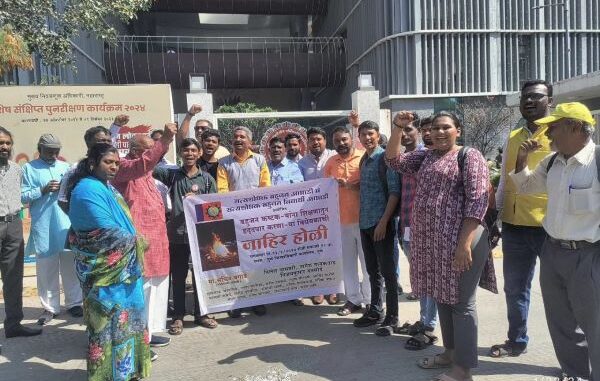India: Protest against private university bill
Shrawani Buwa, New Socialist Alternative, India
Neoliberal assaults on public education in India have intensified in recent years, leading to a surge in private education institutions and a gradual decline in public institutions. Consequently, capitalist interests of the owners of these private institutions now exert influence over education policies. This influence is once again highlighted by a new bill related to self-financing private universities, passed during the winter session of the Maharashtra legislative assembly in December 2023.
Under this bill, students enrolling in private universities would no longer be eligible to claim scholarships from the state government. This compels them to pursue their education only if they can afford to pay the full fees. It is crucial to note that these private universities already impose exorbitant fees, making them unaffordable even for students from middle-class families. As a result, this bill effectively prevents the enrolment of students from the vast majority of working-class families.
Against this backdrop, our student wing, the New Students and Youth Federation (NSYF), in collaboration with Satyashodhak Bahujan Vidyarthi Aaghadi (another student organisation), organised a protest against the bill. The event drew attendance from activists and students across various colleges in the city. Participants expressed their opposition to the bill by symbolically burning copies, denouncing its malicious motives.
I spoke to highlight how the bill exacerbates social inequalities, excluding Dalit and tribal students from the realm of education. Sachin Bagade, state president of Satyashodhak Bahujan Aghadi, elucidated on the severe implications of such legislation and called for the repeal of the law.
To conclude the protest, representatives of the organisations met with the district collector, presenting a letter of demands urging the repeal of the law immediately.
Greek students take to the streets against uni privatisation bill
Tom Gibson, Leeds Socialist Party and Socialist Students
Last year, the capitalist class in Greece seemed to be in a secure position as the incumbent right-wing prime minister Kyriakos Mitsotakis, who has been in power since the fall of the left-wing Syriza government in 2019, won the dual elections last May and June by a landslide.
Mitsotakis has maintained a solid grip on power. The incompetence of opposition parties Syriza and Pasok, has meant no meaningful parliamentary opposition against him. A series of ongoing student protests have provided proof that Mitsotakis can be opposed.
The main aim of the student protesters is to stop a new higher education bill. Greece, unlike much of Europe, has a fees-free university system. Even amid all the austerity this hadn’t changed, until this year when Mitsotakis announced this bill to allow private for-profit universities, putting the system at risk. Mitsotakis claims that the bill will make universities more “relevant to the labour market”. But the students of Greece have not taken this lying down, instead they have taken to the streets.
These protests have been large, mobilising across Greek cities. As expected, the police has reacted violently, and Mitsotakis has resorted to smear tactics against the protesters. This brings back memories of the 1973 communist- and socialist-led student protests that caused the fall of the military junta.
As socialists we call for a higher education system that is completely in the hands of the public without fees or privatisation and fully funded, where the main goal is not the capitalist one of ‘moulding students into tools of capitalism’ but rather educating them, allowing them to pursue their passions.
We stand in solidarity with these brave protesters as they fight for their right to be educated. This struggle provides an inspiring example of students fighting attacks on our education. As our Socialist Students conference takes place in Britain, we understand the importance of the fight for free, public, fully funded, fair and student-focused education.







